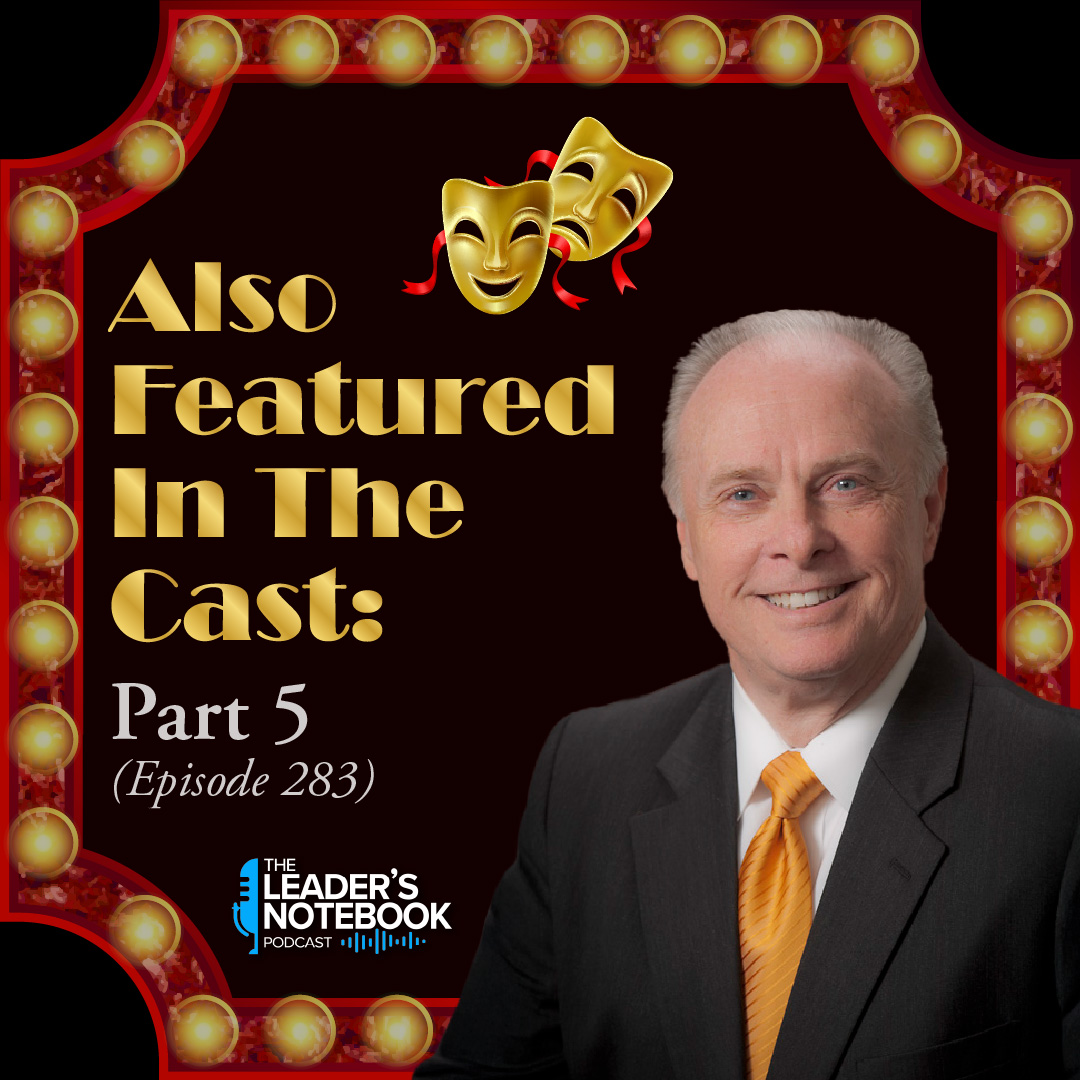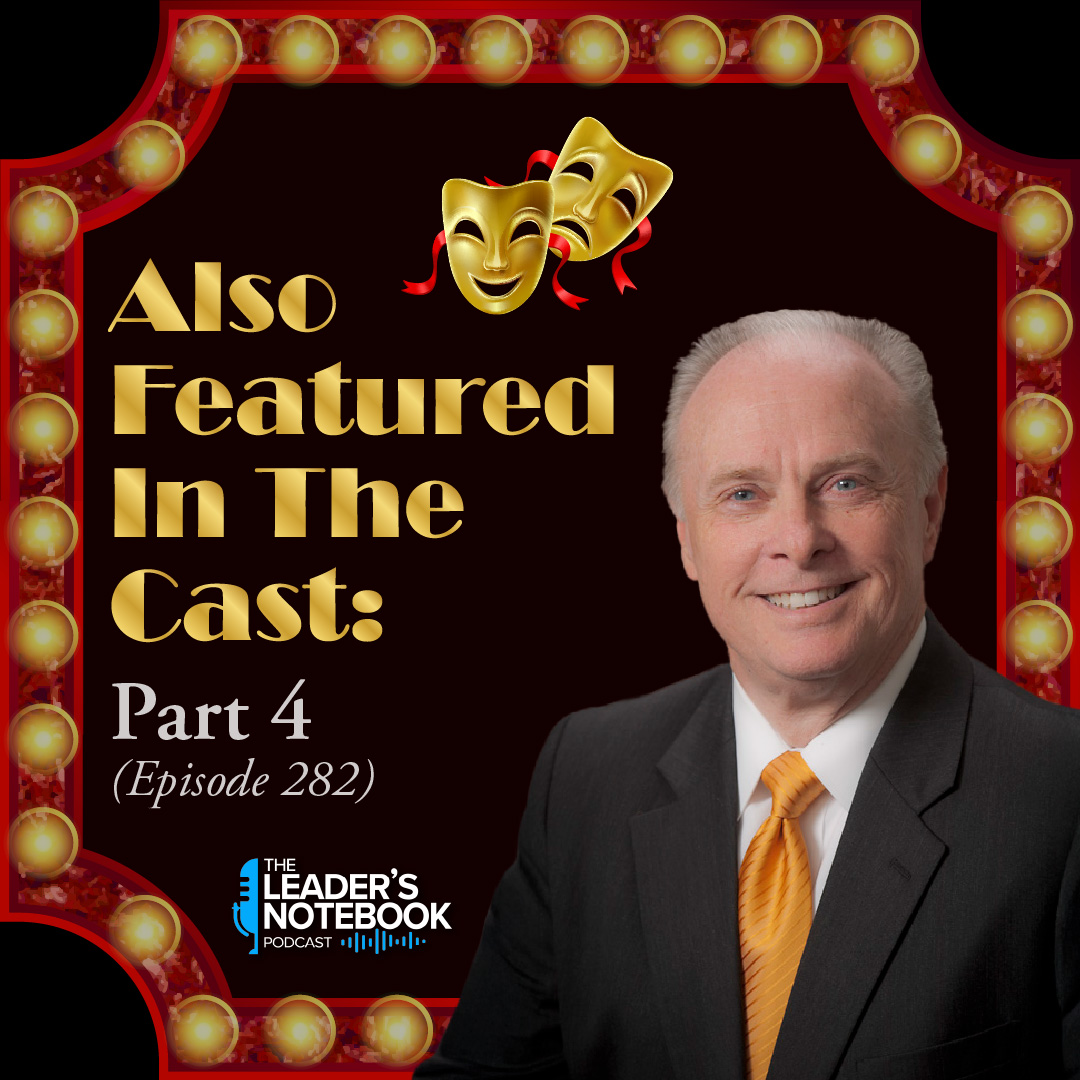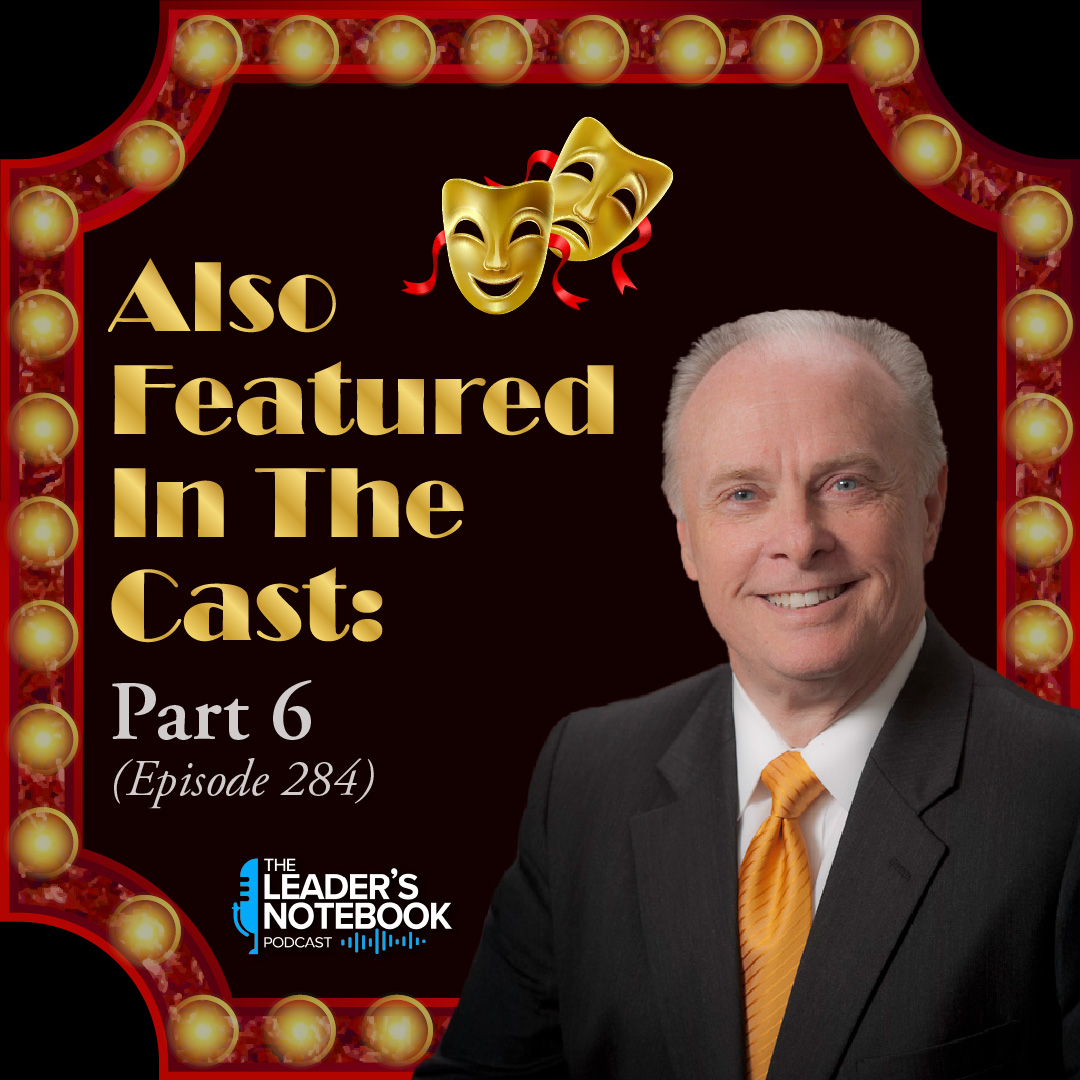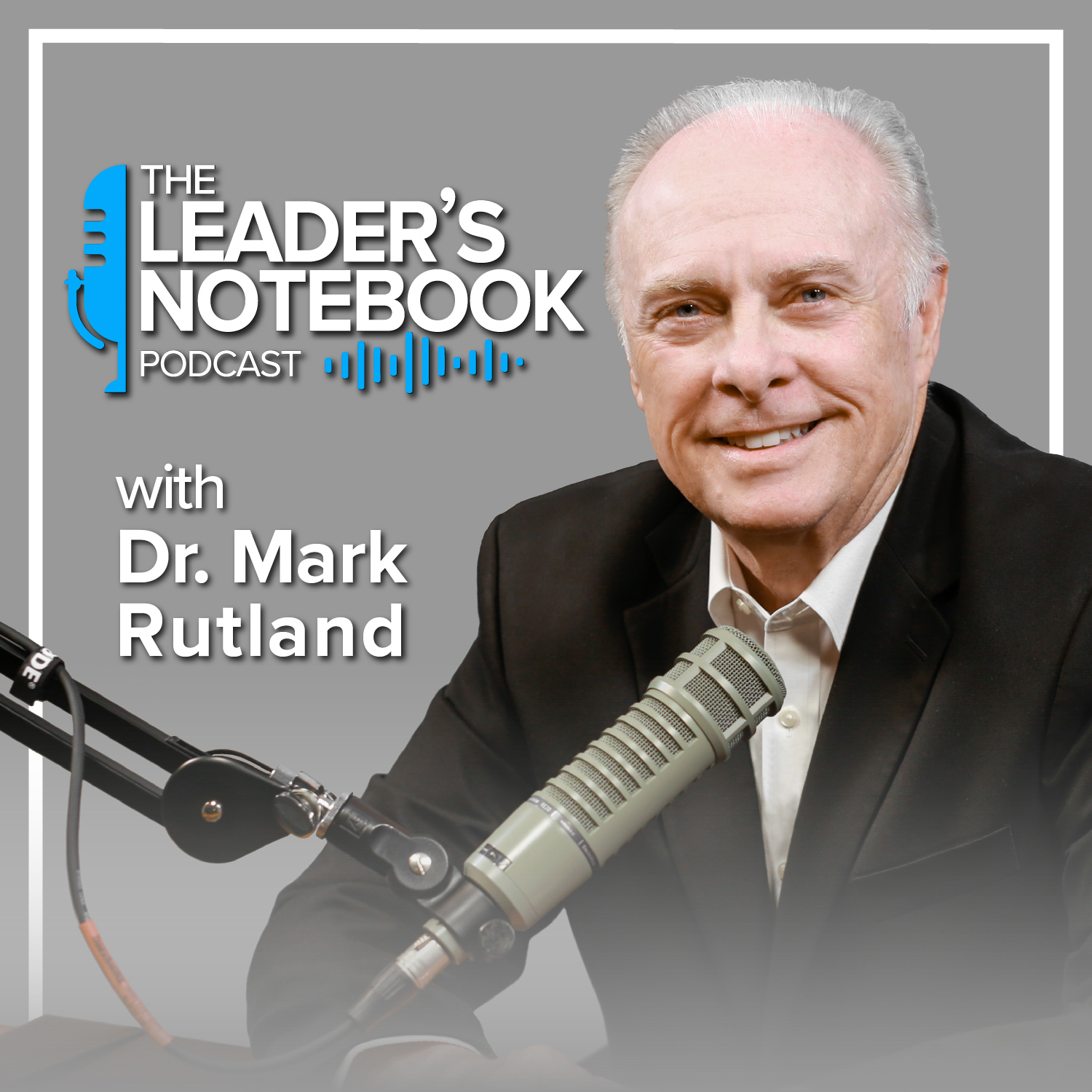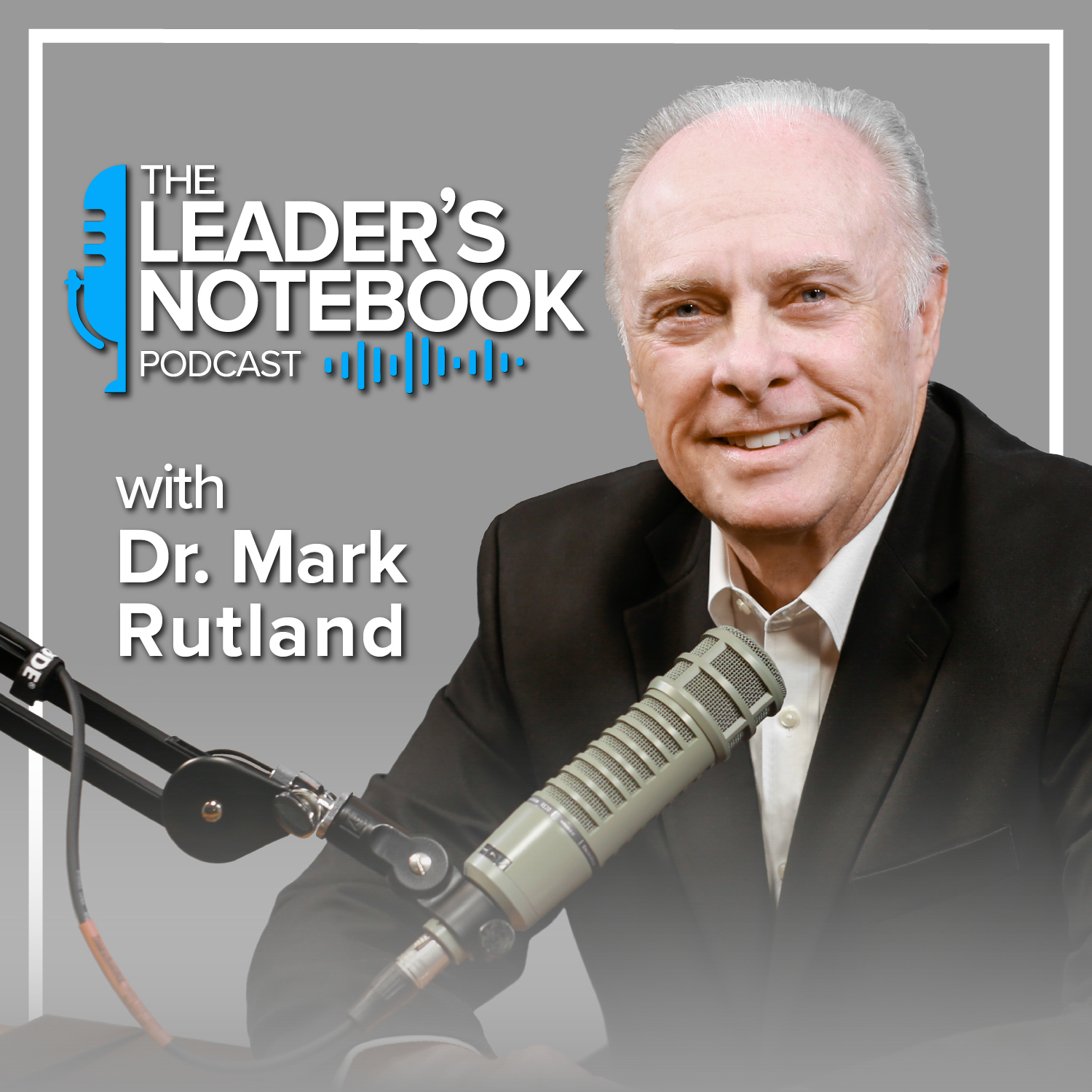Episode Transcript
[00:00:03] Speaker A: Welcome to the leaders notebook with Dr. Mark Rutland. Dr. Rutland is a world renowned leadership expert. He is a New York Times best selling author and he has served as the president of two universities. The Leaders Notebook is brought to you by Global Servants. For more information about Global Servants, please Visit our website globalservants.org Here is your host, Dr. Mark Rutland.
[00:00:25] Speaker B: Well, I hope you're enjoying this series on I've been calling it also featured in the cast.
The idea is based on the fact that in every theater production or movie that there's somebody that's the star.
It's the Michael Corleone movie, but you've also got Fredo. There's always somebody that's there in the story. And so I've been choosing people that are kind of sometimes behind the scenes a wee bit and not concentrating on the big star.
And tonight we're going to be talking about Solomon, but it's not about Solomon. We're going to be talking about people also featured in the cast of the Solomon movie.
Now, each week I've also presented to you somebody just as a curiosity thing, just to get your attention, somebody that has been in the movies or something like that, that, that you don't know who they are, you don't know the name perhaps, but they somehow or another when you see them, you say, oh, that, that guy, that person.
Well, here is a young girl named Vivian. She was born in 1909. Isn't she a sweet little thing? And she was born in Kansas in 1909.
In 1933 she got her first movie part.
She was 24 years old as a young starlet in a movie. But she never really caught on. She was just always kind of one of the girls that was in movies. She was never the, the heroine of the movie. She was always the bridesmaid. Never the bride until actually television was what made her life.
It was a TV show that finally gave her a real opportunity, a new show.
This show featured a Cuban bandleader and his ditzy redheaded wife who rented an apartment in New York City from a man named Fred Mertz.
And this girl, Vivian. Vivian Vance played Mertz's wife Ethel.
And there's Lucille Ball and Vivian Vance, that sweet little girl from 1933 became really an indispensable feature of the show, I Love Lucy.
Now straight to the Solomon movie, the third King of Israel, the son of King David.
But we're not going to concentrate on Solomon tonight. What we want to concentrate on people also featured in the cast.
So first of all, let's deal with somebody who was also featured in the. In the David movie. He played an important role in the David movie, but he was just featured in the cast. David's the hero of his own movie. This guy was in the David movie. Now he appears in the Solomon movie. So it's kind of like Godfather Part one and Godfather Part two, but he's in. He's in both of them.
And his name is Nathan.
Nathan is a prophetic voice in the life of King David, but he figures dramatically in the life of Solomon.
Nathan, if you remember. Let's just. In order to rehearse it in our minds, it is Nathan who rebukes and calls David out over his affair with Bathsheba, the wife of Urah, the Hittite, and the fact that David not only had the affair, but impregnated her in the affair and then covered it up by having Uriah murdered. It was. It was a connivance on the battlefield to get him killed anyway. And it was Nathan who called him out. I'm not going to go through the whole story, but you remember with the. With his story about the man who stole his neighbor's lamb and served it to guests rather than take one from his own flock. And David repented, admitted to it, all of that.
But by that time, Bathsheba's baby, which was David's through the affair, had already been born.
And Nathan said to David and Bathsheba, your sin is forgiven. God is with you, but the baby will die.
And you remember David fasted and prayed, and he wouldn't eat or anything until the people around him thought he was losing his mind even.
And the day the baby died, they came in, they were afraid to tell David because they thought if while he's going like this, grieving like this, while the baby's still alive, if we tell him, he may lose his mind. But David, ever unpredictable. When they came in and told him the baby has died, David got up and shaved and washed his face and had something to eat. And they said to him, we don't understand you.
Why did you go through all that while the baby was still alive? And now the baby's dead, you just say it's over. He said, look, I didn't know. It's something like what your pastor said tonight.
He said, I didn't really. I didn't know what God was going to do.
So David said, my vote was for a miracle and for grace. And I fasted and prayed and believed God. But once the sovereign will of God is done, it's done.
Now, why should I go on fasting now?
But then we come to this verse, which is 2 Solomon, chapter 12, 2 Samuel, chapter 12. And verse 25.
And God sent it, says he. But God got sent by the hand of Nathan the prophet, and he called his name Jedediah.
That is the God given name for Solomon.
And God sent by the hand of Nathan the prophet and called his name Solomon, he becomes Solomon Jedidiah because of the Lord.
Now, I just want you to look at the verse.
This is.
Go back to 24, and then we'll come back to 25. And David comforted Bathsheba his wife, and went in unto her and lay with her, and she bore a son. And he called his David, called his name Solomon.
Look. And the Lord loved him, says one of the more striking verses of Scripture in the Bible. Here is God has punished them with the death of this baby, conceived in adultery.
And the same couple, now married, have a baby. And. And God loves that baby. There is in many of our lives, a baby.
Using the term baby in terms of literary sense, a baby of judgment and a baby of grace.
A birth of condemnation and a birth of grace.
And when you think that God has punished you and vexed you and done everything that he can do, and you repent, and then God says, yes, but now the name of this baby is Jedidiah, because Jedidiah in Hebrew means the Lord's. He is beloved of the Lord. The Lord loves him.
David. By the way, David in Hebrew means beloved, but Jedidiah means beloved of the Lord.
Now, that's Nathan.
He announces this judgment, this in open court, denounces David. This hard, cutting edge. Then he shows up to announce grace. God loves this baby. Nothing bad. I just want you to keep Bathsheba in your mind. We're coming to her.
But when that second baby was born, and they're all in the court with the lords and ladies and everybody there, and she's holding the baby and showing that baby, and. And somebody said, nathan's here.
Can you imagine what Bathsheba felt?
Can you just imagine what Bathsheba felt? And Nathan came in, and I can just imagine her. Maybe it's my theatrical spirit, but I can just imagine her trembling and putting her hand over the baby. And Nathan says, don't worry, his name is not Solomon, it's Jedidiah. He is beloved of the Lord.
So that's the second appearance of Nathan, but the first appearance, he's a character in the David movie.
Now he's a character in the Solomon movie, but he's in the moment of the baby, Solomon.
Now, as Solomon comes to adulthood, David is fading in health and dying. He. He becomes. He's suffering, evidently, from heart disease. He. His circulation is bad. He's cold all the time, and he's dying.
And Nathan shows up again.
And to whom does he come?
Bathsheba.
If there was ever an odd alliance in the entire Bible, it is the alliance between Nathan, who announced God's punishment by giving death on her first baby.
And now he allies with her to put Solomon on the throne.
Nathan arrives and goes to Bathsheba and says two things. The king is dying.
The second thing is one of your.
One of Solomon's half brothers, Adonijah.
Adonijah has entered into a covenant with Joab, David's top general, his top man, also a kinsman, a relative.
And he says, Joab is going to put Adonijah on the throne, but his name is not Jedidiah.
He is not beloved of the Lord. He's vain and stupid and shallow and manipulated by a dark figure named Joab. And you and I, Nathan and Bathsheba, this odd alliance.
They go to David on his deathbed, and he sends Bathsheba in first, and he says, go in and say to David, go. Did you not promise me Solomon would be on the throne?
David's dying, and she says, didn't you tell me Solomon would be on the throne? David said, I did promise. And immediately Nathan comes in and says, well, right now they're about to put Adonijah on the throne. Joab is about to anoint and manipulate a coup d' etat and put Solomon on the throne.
And David rouses himself on his deathbed, and he says to Nathan, what should we do? And Nathan gives him advice, and they take Solomon right then and put him on the king's mule. I know that that sounds odd to us. We think of the luxurious animal being a horse, a stallion, but actually, only royalty were allowed to ride mules.
And so they put Solomon on David's.
David's mule, and they take him down to the pool at Gihon and anoint him as the king. Nathan anoints him as the king, and the word spreads through Jerusalem, and people are shouting, long live King Solomon. Long live King Solomon.
And Nathan beats Joab to the punch.
If Nathan had not responded to the guidance and direction of God supernaturally, Adonijah would have been on the throne, and Adonijah and Joab would have killed Solomon immediately.
So we have this person of Nathan.
He is prophetically motivated.
He can be hard, you are the man.
He's bold, he's courageous, but he is not.
He is not merciless.
He simply speaks the hard word for God.
Now, I want you to hold Nathan over here.
Now we're going to deal with some other people and then we'll come back to consider the part that Nathan plays.
So the second person we want to look at is Adonijah himself, who is a minor player in the Solomon movie. He is Solomon's half brother, David's son by another wife.
And he is. He's vain.
He knows he shouldn't be the king. He would be easily manipulated. He would be controlled by Joab.
And yet he makes a grab for something that's not his.
He is conniving, ambitious, shallow and vain.
Then there is Joab.
Now, Joab is a huge player in the David movie, but we're not in that movie. We're in the Solomon movie. We're in Godfather Part 2.
And Joab and plays a huge role in the first part of the Solomon movie.
But we have to understand what he was in the David movie. He was David's top general.
He was his kinsman. He was with him from the beginning. He was loyal to David, he protected David, he fought with David, but he was absolutely remorseless when it came to killing.
I always used to tell the kids at the universities when I would teach on David, if David was Wyatt Earp, Joab was Doc Holliday, this guy would bust a cap in you for a quarter.
And he was trigger happy.
One general David sends Joab and sends message to another general to meet at a certain intersection and join their armies together and support David. And that general is simply late to the intersection. He arrives late and Joab opens him up with his sword and leaves him by the side of the road with his innards spilling out and makes the rest of the army march past him.
I bet you after that, if Joab said attention, everybody snapped to attention. What do you bet?
But this is who Joab is. He's. He's dangerous. He's a general. He's a warrior, he's a killer.
But he has been ferociously loyal to David.
Now he goes against David's will. He knows Solomon is David's choice.
Why does he do it?
Because he knows he cannot control Solomon.
He wants this vain pup Adonijah on the throne because what Joab wants to be is the power behind the throne.
He can't be the king, but he wants to control and manipulate Adonijah. All Adonijah wants is, is to be the King and Joab. Now, after a lifetime of faithful, loyal, serving David, now at the end of everything, he goes against David's will, knowing he has engineers a coup d' etat and tries to put somebody else on the throne.
As soon as the word reaches, they're having a big party where Solomon is, where Joab is about to bring in a priest named Abiathar. And they're going to anoint Adonijah as the king. And somebody begins to shout in the street, long live King Solomon.
And they go out and say, what in the world are you talking about? And they said at the spring at Gihon, they've just anointed. Nathan is just anointed, Solomon is the king. And he's riding through the streets on the king's mule.
And everybody at the party is diving out the windows because now this meeting is treasonous.
So Joab runs into the tabernacle and grabs hold of the horns of the altar.
And he says to himself and to everybody, if Solomon wants to kill me, he's got to kill me right here.
And he underestimates this new young king.
And Solomon sends a guy in there and says, give him what he asked for.
Joab represents that person who fails at the end.
What a tragedy.
He has been David's man, his guy, his go to his general, his top associate pastor, his executive vice president.
He's been his man who risked his life, could have died a thousand deaths on a battlefield, did everything that David ever asked, and at the end loses everything and dies in infamy, killed by his kinsman Solomon because he tried to engineer a coup d'. Etat.
What could Joab have been?
He could have been Solomon's top general.
He could have stayed right. Solomon would have was wise.
He would have kept Joab right in place. But he didn't want to be Solomon's top general. He didn't want to work for the young guy.
He worked for David because he respected him and admired him and may have been afraid of him, but he. But he wasn't going to work for this pup.
And so he wanted Adonaij on the throne because he could control the Adonijah and basically run Israel.
Now, there is another person in the story that is in the Solomon story, and she plays a huge part.
That's his mother, Bathsheba.
First of all, like every one of us in this room, there would be no you movie without your mother.
So your movie started with your mother. And Solomon's movie starts with his mother. This is her second child now born of marriage and anointed by grace and confirmed by God. David calls him Solomon. And he is called Solomon through the Scripture, but God calls him Jedidiah. My beloved.
We must have sinned.
That Bathsheba had great influence upon Solomon.
Solomon grew to be this wise king in many ways. This is not the Solomon movie. We're not worried about Solomon. We're dealing with the people around him. We know Solomon ended badly, but he began well.
And maybe that was the influence of Bathsheba.
But having said that, this half brother, Adonijah, who was trying to get on the throne ahead of.
Ahead of Solomon, Solomon tells him, I'm not going to kill you.
You're my brother. You're my half brother. At least I'm not going to kill you.
If you'll behave yourself, live here in Jerusalem.
Don't.
Don't cross me. But stay here and do the right thing. I'll let you live. I grant you grace.
But Adonijah won't leave well enough alone.
If you'll remember, as David was dying, his circulation was so bad that he was cold all the time.
And so there are no heating pads.
There's no electric blankets.
It's 1000 BC.
How can they keep him warm? They find a young virgin girl. Her name is Abishag.
And they put Abishag in his bed. There's no sexual contact.
She sleeps with him in order to keep him warm until he dies.
Adonijah goes to Bathsheba.
Bathsheba is not his mother.
Bathsheba is Solomon's mother.
He goes to Bathsheba and appeals to her. He says, I've fallen in love with Abishak.
Go to your son and appeal to him to let me marry Abishak.
And Bathsheba does it. She goes to her son and she says, he wants Abishag. You've got the throne. You've got the crown. You've got the power. He hasn't gotten anything. He hasn't got anything.
Let him have Abisha. And Solomon says, mother, are you crazy?
Are you crazy?
He says, if he had won, you and I would both be dead right now.
He would have killed us without a moment's hesitation.
And now what is he doing?
He is insinuating himself into the line of David by marrying the last woman that was with David.
He's claiming David. The girl who was in David's bed never had sex with him. But she is connected to David, our father, and by marrying her, he stakes a potential claim on the throne.
And Solomon has him killed.
Adonijah is killed.
This is tough politics for us in the 21st century.
However, I've watched Washington D.C. over the last eight or ten years.
It's not totally shocking.
Now, what about Bathsheba?
So Bathsheba is a mixed element.
On the one hand, we must.
Our heart must go out to Bathsheba.
She is.
She is the classic case of a woman seduced by a man in a powerful and wealthy position.
Some contemporary feminists want to call it rape. There is no indication in scripture that there was any kind of force used.
However, David was the king.
He was in a position of power and wealth and celebrity.
Maybe it would have been extremely difficult for her to resist.
At any rate, she didn't.
And she was seduced. The blame is on David.
In Psalm 51, when David deals with the whole thing before the Lord, he says, against thee and thee only have I sinned and done that which is evil in thy sight. He never mentions Bathsheba. He said, this is my sin.
But it gives us a window into the weakness of Bathsheba.
That she was ever the romantic.
She was unrealistic about the. The appeal that Adonijah was making about Abishai.
Now, listen, I wanna give you a word here. It's kind of hard to hear, but I want you to just take it in your heart and hear it.
Sometimes indecision making in life, in relationships, in families, in businesses, in companies, Making an emotional and romantic decision that is unrealistic can be as costly and dangerous as making an evil decision.
I'm not saying it's evil. She was not an evil person. She was romantic, unrealistic.
She couldn't face the cold, hard facts.
The decision that she made to represent Adonijah with his half brother, with her son, was an unrealistic romantic decision.
She couldn't open her eyes and see reality.
That was the weakness of Bathsheba.
Not that she was. I think it's wrong for us to project onto Bathsheba some huge level of wickedness. She was seduced by a powerful man, but she was romantic and unrealistic.
I was on an airplane one time and there was a lady next to me that was reading. Reading a book.
And I just asked her the. About the book. I'd seen the title of the book, and I said, what, did they make a movie out of that? And she said, yes. And I said, did it have Clint Eastwood in it? And she said, yes, it did have Clint Eastwood and Meryl Streep. And I said, oh, yes, that's about the. The photographer. And. And he has an affair with his housewife, right? And they. They commit adultery. She looked at me like I was speaking Hebrew. She said.
She said, what are you talking about?
I said, isn't that the story? She said, it's Clint Eastwood and Meryl Streep.
So it can't be adultery if this movie stars.
Do you understand what I'm saying?
Her whole judgment of that. What would have been crass adultery if it was just a housewife and some plumber in a double wide?
But because. Because it's movie stars. It's an unrealistic romantic view of life.
And that's the. That's the downfall of Bathsheba. And by the way, she's never mentioned again.
Then there is a priest named Zadok.
So David's high priest throughout his career has been Abiathar.
And Abiathar served David faithfully. But deep in his heart, he blamed David for the death of his father.
And he never got over it.
So when Joab formulated the plot to put Adonijah on the throne, they needed a priest to do the anointing. And they got Abiathar.
Solomon and Nathan go to a different priest, Zadok.
And Zadok becomes that faithful priestly influence.
He is the first high priest of the Temple.
When Solomon builds the temple. Zadok, this is huge.
This is a huge position.
The first high priest in the Temple. Of course, the first priest is Aaron in the tabernacle. But the temple, Solomon's temple, is built.
The first high priest in the Temple is Zidok.
In Ezekiel, chapter 44 and verse 15, there is a reference to false priests and those that live in wickedness and those kinds of things. And God says, I don't ever want them to come near me. I don't ever want them to come near me. But the sons of Zadok, I want them to serve me.
How marvelous that written down in Scripture and celebrated all these thousands of years later. God affirms the faithfulness and holiness priestliness of Solomon's priest, which is Zadok.
Now, I told you to hold Nathan, remember? Is this story complicated? Are you everybody okay with me so far? I guess I should have handed out a diagram or something. But I want you to see Solomon standing here. All right.
And this is all of us.
On the one side.
There is this cutting edge of prophetic truth that God, the Holy Spirit and God, through prophetic voices, can speak to us. The word of rebuke, the strong word from God.
Now also a word of great grace and healing. But it is. But Nathan shows Up as the voice of God.
He's that edge, that side on David and on Bathsheba and on now on Solomon. He's that prophetic edge, the voice of God.
Zadok is that priestly edge.
Zadok is the, is the, the priest, the parish priest, the family pastor. He's the guy that comforts and anoints and heals and prays and. And he becomes that holy priest. There is a pastoral type office, priestly office, associated with Zidoc.
We are all here.
There has to come those times when the voice of God, that prophetic voice of God, sometimes in a sermon, sometimes through a preacher, sometimes through a voice of prophecy, sometimes directly by the Holy Spirit.
When God rebukes us, challenges us and announces things that are going to happen that we don't want to hear and calls it out.
There are other times when we, we have to hear that voice of grace, when the Holy Spirit speaks. That's that prophetic edge. On the other hand, we also need that comforting priest.
So Jesus is called prophet, priest and king.
He is king of the universe and king over our lives.
He also is the fulfillment of all prophecy.
He is the prophetic voice in our lives. But he is also our high priest. After the order of Melchizedek.
He is interceding for us, praying for us. As Zadok was the high priest in the temple. Jesus is the high priest in heaven and he is. He comforts us, prays for us, counsels us, teaches us. He's that priestly side.
But there can come those times when he steps in as the Holy Spirit and there comes that prophetic edge, that cutting edge.
Why is the word of God called a two edged sword?
There's really. You only need one edge on a sword.
Why is he called the two edged sword?
Because it slashes one way and opens us up.
The wound that grieves us.
When our sin is exposed, our weakness is denounced.
It slashes and grieves us.
But the other edge slashes and heals us.
A man came to me after a church service one time and he said, I'm leaving the church.
He said, I'm sick of it.
All you preachers ever preach on. And he said, you, all you ever preach on is money.
And he said, I'm sick of it and I'm leaving the church.
I was very young.
It was my first church.
And it grieved me.
In those days we taped all the sermons and we had little cassette tapes. Does anybody in here even remember cassette tapes?
We used to. Everybody used to have Them Bob Mumford said, you shall know them by their tape recorders.
I was so grieved.
I was 23, my first church, and I was so grieved. I went home and listened to that whole sermon.
There was not one reference, directly or indirectly to money.
There was not one reference in that sermon. I never mentioned it.
I thought back over my preaching.
I can't believe the message. Maybe three or four times in the year I had preached anything to do with money. How. And then it dawned on me. That man heard another voice.
That man didn't hear my voice. I never said a word about money.
The sting that he heard, that punch that dealt with him about his attitude about money, that was the prophetic voice of the Holy Spirit. And instead of hearing it and saying, yes, yes, I do have a sinful attitude, yes, I am wrong, he rebelled against it and lost out on the issue of the prophetic edge.
We have to keep this in our minds.
It's not really the will of God for us to be happy. It's the will of God for us to be holy.
And sometimes he comforts us. Sometimes he puts his arm around us. Sometimes he says, you are beloved of the Lord. Your name is Jedidiah. I care for you. Let me be priestly with you. Let me care for you. Let me teach you. Let me. Let me anoint you as Zadok anointed Solomon. But there are other times when he says, I'm going to deal with you now.
I am going to deal with you because I am the Lord thy God.
And that's.
That's the tension in which we live. We. We in this contemporary American church, so emphasize grace. And I'm not saying that's wrong, but I'm just saying we have so emphasized grace and the friendship with God. I'm the friend of God. He, Jesus is our friend. All of that is real.
But sometimes the emphasis on the friendship that we have is with God. What a friend we have in Jesus. We sang it here a couple of weeks ago.
But sometimes the emphasis of that can make us casual with the things of God.
And there can come those moments where God says, this is holy ground.
Take off thy shoes from off thy feet and fall on your face.
There can come times when he says, I love you, I forgive you, and I want to comfort you.
There can come times when he says, that which you have birthed in sin will die.
And he still.
He is still a good God.
[00:37:55] Speaker A: You've been listening to the Leader's Notebook with Dr. Mark Ruther. You. You can follow Dr. Rutland on X @Dr. MarkRutland or visit his website, drmarkrutland.com where you can find information about his materials and his app. Join us next week for another episode of the Leader's Notebook.
